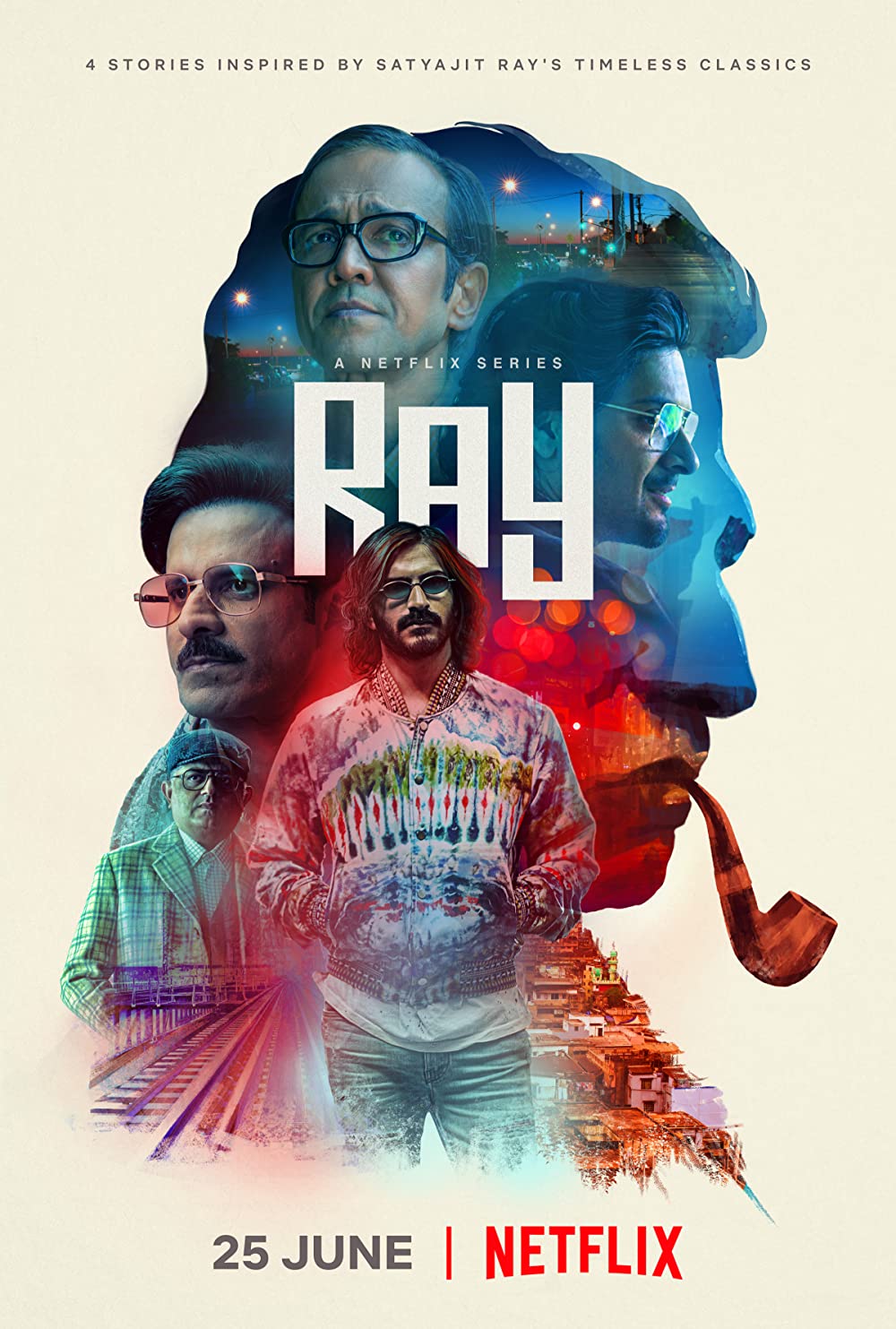Culture & Lifestyle
Inside the human psyche
‘Ray’ brings Satyajit Ray’s timeless short stories to life on screen, exploring the complexities and consequences of social pressures in a contemporary setting across four episodes.
Anish Ghimire
In the series ‘Ray’, four short stories by Satyajit Ray, written decades ago, are skillfully brought to life on screen in a contemporary setting. Each episode delves into the human psyche, grappling with the complexities of modern society.
In the initial episode, we meet Ipsit (Ali Fazal), a successful entrepreneur riding the wave of youth and armed with a brain adept at storing data and crunching numbers. He takes pride in his abilities, perhaps a bit too much, to the extent that his special trait loses its charm.
Titled ‘Forget Me Not’, this focuses on Ipsit’s psychology and explores the consequences when his strength becomes a weakness. We witness the downfall of the self-proclaimed ‘Entrepreneur of the Year’ as the man with an unparalleled brain starts forgetting everything.
Through Ipsit’s story, we come to understand that pride rests on a fragile foundation. When it crumbles, a person’s confidence and ego follow suit. His own actions contribute to his predicament—hiring friends as lower-level employees, betraying his business partner, engaging in inappropriate behaviour with his assistant and being unfaithful to his wife.
His friends, fed up with his behavior, turn against him and convince him that he is forgetting things. The therapist even suggests the possibility of dementia, which doesn’t align with Ipsit’s pride in his calculative mind. Consequently, Ipsit loses control of his life, leading to the expected tumult and emotional outbursts characteristic of psychological dramas.
Despite his promising potential as an entrepreneur and a seemingly upward career trajectory, his downfall was brought about by his behaviour and arrogance. He wasn’t actually forgetting things, he was manipulated into believing he was by his friends-turned-conspirators who targeted his strengths for their own gain.
In the second episode, titled ‘Bahrupiya’, Kay Kay Menon takes on the role of Indrasish, a character reminiscent of an Indian version of Joaquin Phoenix’s Joker and Robert De Niro’s Taxi Driver. Indrasish, marginalised by society, grapples with low self-esteem and disdain from those around him.
His boss berates him for irregular attendance at work, his girlfriend rejects his marriage proposal, and he harbours resentment towards his landlord. These rejections trigger an evil side in him, especially after the death of his grandmother, the only person who truly loved him. The episode’s atmosphere is murky, mirroring the bleak life of Indrasish.
A man with a good heart, he undergoes an identity crisis, although the portrayal of his psyche lacks clarity, compared to the first episode with Ipsit. Faced with his internal turmoil, he resorts to creating face masks and adopting different personas to conceal his crisis. Uncomfortable being himself, he walks around with a façade, plotting revenge against those who wronged him.
His pursuit of revenge stems from deep-seated insecurity, which makes him question why he can’t be secure in his own identity. Unable to accept himself, he resorts to wearing masks of other people. When he becomes someone else, a newfound power allows him to act freely. Despite repeatedly convincing himself that he is the person behind the mask, he cannot escape his true self, no matter how hard he tries.
His insecurity becomes apparent when his girlfriend rejects him, and he scolds himself in front of the mirror, reflecting the pain of heartbreak. However, when he wears a mask and assumes another identity, he no longer feels insecure; instead, he is filled with a sense of power.
Yet, a lingering emptiness persists within him. Despite inheriting a significant sum from his grandmother, he fails to use it to improve his life. Instead, he roams around assuming different personas, attempting to view himself from a higher perspective. His choices ultimately lead to his downfall when a mask of a child rapist becomes stuck to his face, and the public turns against him. His desire to become someone else is fulfilled, but at a great cost.
In the third episode, titled ‘Hungama Hai Kyon Barpa’, Manoj Bajpayee portrays Musafir Ali, a poet who dons silk clothes, carries a diary, and uses a few carefully chosen words to impress those he encounters on the road. However, rewinding the clock reveals a less-than-decent past for this seemingly refined poet. He grapples with kleptomania, a mental disorder compelling a person to steal even when unnecessary.
Before adopting the name Musafir Ali, he was Raju, a person who couldn’t control his urge to steal. Raju amassed unnecessary items, wrote poetry and wandered in search of employment. Despite collecting numerous stolen valuables, he didn’t feel fulfilled. Instead, with each passing moment, his misery deepened.
One day, during a train journey, he encountered a fortunate traveller who exuded good times. Envious and constrained by his disorder, Raju steals the traveller’s luck, embodied by a watch symbolising good fortune. This act transformed Raju into Musafir Ali, marking the beginning of a series of positive events. Carrying the gold-plated watch everywhere, he found relief from his affliction.
A priest had advised him, "To overcome the stealing sickness, embrace another sickness—in your case, that is poetry." Raju followed the priest’s counsel, making poetry his new obsession, effectively forgetting about Kleptomania. However, a chance encounter with the same traveller on a train journey after ten years brought back Raju—his old self. Overwhelmed by guilt, the good luck clock in his bag began to tick louder.

A similar theme of guilt is explored by Edgar Allan Poe in ‘The Tell-Tale Heart’, where a murderer confesses due to the sound of the victim’s heartbeat echoing in the room. Likewise, Ali confesses to the traveller, and a perplexed expression appears on the traveller’s face—neither happy nor sad, but marked by puzzlement.
In the end, we come to understand that the watch’s true value wasn’t in its material worth but in the time it represented. As the traveller aptly puts it, “Time is beautiful.” Realising this, Ali visits a pawn shop where remorseful thieves deposit their stolen items. Unloading each item pilfered since childhood, he feels a weight lifting off him with every release. The sigh of relief he experienced when handing over the clock to the traveller in the train is now echoed in the process of unloading.
During this process, he discovers that a precious possession of his was also in the shop, stolen by the traveller who, like Ali, had a sickness of stealing. Both attempted to overcome their affliction but only managed to try. Reflecting the beginning when the traveller asks Raju, “What do you do?” and Raju replies, “I try.”
The last episode, however, serves as a mild contrast, slowing the pace after the intensity of the first three episodes. In this episode titled ‘Spotlight’, Harsh Varrdhan Kapoor portrays Vikram—an attention-seeking actor overly proud of his appearance. Lacking acting prowess, Vikram boasts about his appealing “look” and the adoration he receives from fans.
Enter Didi, a godwoman with a holy aura, her face deemed the most precious by her devotees. Similar to the first episode, a man’s self-esteem takes a hit when his unique appeal is challenged. Vikram feels deeply unsettled as people begin to ignore him in favor of Didi. He questions, “How can her ‘look’ be better than mine?”
He initially dismisses Didi, questioning her followers about their beliefs. Later, he humbles himself by kneeling before the godmother, asking, “What is in that look of yours?” Prior to this, we witness a less engaging sequence of scenes where the actor becomes miserable, losing his appeal. The usual drinking, banging on the table, shouting loudly, and laughing at his reflection unfold, creating a scene that suggests he’s losing his sanity.
The episode’s execution, direction-wise, may seem somewhat lacking. Towards the end, the story loses some of its spark as the dialogues lack creativity, and the scenes lack proper buildup. However, it’s possible that the director intended the episode to be this way to highlight the blind faith people have in considering ordinary individuals as gods.
Ray
Cast: Ali Fazal, Kay Kay Menon, Manoj Baypayee, Harshvarrdhan Kapoor
Year: 2021
Language: Hindi
Available on: Netflix




 9.89°C Kathmandu
9.89°C Kathmandu

.jpg&w=200&height=120)













